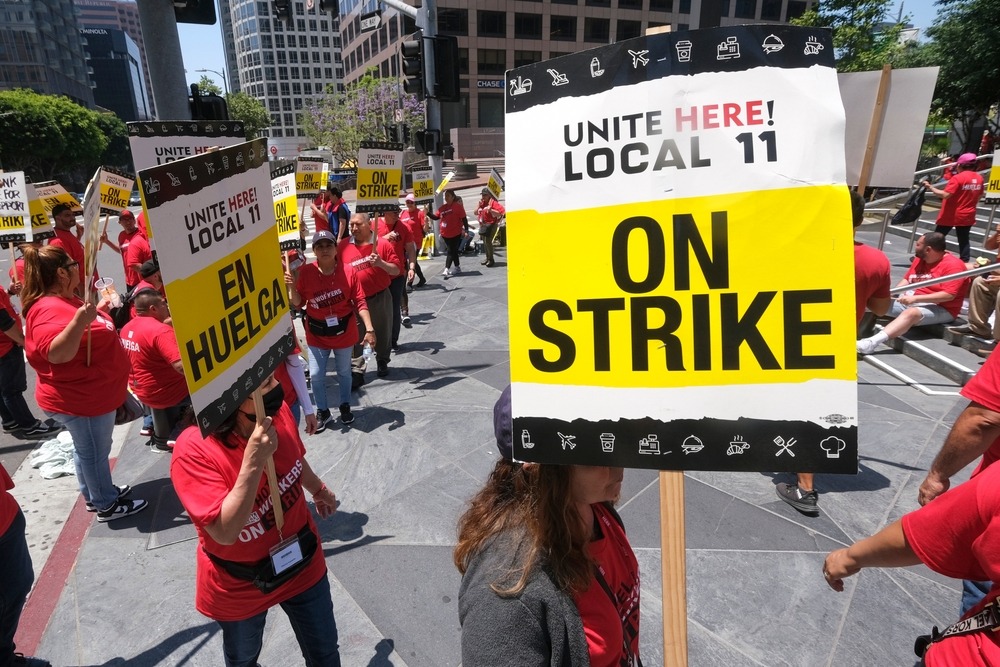Everything you need to know in case of venue union actions
It’s getting serious out there.
How serious? Taylor Swift was asked to cancel her concert dates.
The Arizona Diamondbacks, in town for MLB’s postseason, were asked to abandon their hotel.
And what about in your world? What happens if on the morning attendees begin to arrive for the meeting you’ve planned for months, a rolling hotel strike arrives at your venue’s door? Picketers banging on drums and shouting out contract demands, with ugly confrontations ensuing.
And your attendees? They face the gauntlet of the picket line. And its challenge: to cross or not to cross?
Los Angeles is the setting for this scenario. Housekeepers, cooks, dishwashers, servers, bartenders and front desk agents represented by UNITE HERE Local 11 at more than 60 hotels have been staging work stoppages at a few sites at a time since last July Fourth weekend. They are demanding wages to help keep pace with the skyrocketing cost of housing, better pension plans and healthcare, and “humane” workloads.
Since the strike began, they have asked group and leisure travelers to boycott unionized hotels across L.A.—thus their call for the Diamondbacks to check out of their downtown luxury hotel and Taylor Swift to cancel because her fans were flocking to fill guest rooms at surge-rate prices.
The union says the number of workers authorized to strike is the largest in U.S. history. But it is far from the only labor action in the hospitality world.
What do meeting professionals need to know? How can they protect their events? What contingency plans do they need to have? What contract clauses? How do they need to communicate with executives, memberships, attendees? Read on.
The Ripple Effect
These days, the resurgence of unions is making national headlines, and the ripple effect of where strikes against major meeting venues are either ongoing or threatened widens, it seems, by the week. Detroit, for instance: In mid-October, at a time when some 34,000 United Auto Workers and more than 1,000 employees of Blue Cross Blue Shield of Michigan were on strike, thousands more workers walked off the job for the first time since Detroit’s three casino hotels—with combined meeting space of over 100,000 sq. ft.—began operating in the late 1990s. The Detroit Casino Council, which represents 3,700 casino workers across five unions, wants better wages and benefits after agreeing in 2020 to almost no extra pay to help their employers survive the pandemic and government-mandated shutdowns.
Johanna Lams, a table games dealer and local union official, told The Detroit Free Press some casino hotel employees couldn’t afford to live near work. “They’re sleeping in their cars,” she said.
“The resurgence of unions is making national headlines, and the ripple effect of where strikes against major meeting venues are either ongoing or threatened widens, it seems, by the week.”
Las Vegas, for another: IMEX America managed to dodge a bullet as members of the Culinary Workers Union Local 226, the largest labor union in Nevada, and the Bartenders Union Local 165 voted nearly unanimously to authorize a strike along the Las Vegas Strip just weeks before nearly 15,000 meeting professional and hospitality attendees, a record number, flocked to the show at MGM’s Mandalay Bay Resort & Casino.
Read More: Las Vegas Hospitality Workers Authorize Strike on The Strip Weeks Ahead of IMEX America
In the days leading up to showtime, Carina Bauer, CEO of IMEX Group, said she was “in regular contact with the team at MGM” and was closely monitoring the situation. Happily for IMEX and those who flew in for the event from around the world, negotiations for a new five-year contract between the hotel companies and union continued and no strike deadline had passed.
The unions have ambitious goals. In addition to the biggest wage hike ever negotiated in the history of the Culinary Union, major issues include reducing housekeeping workloads while mandating daily room cleaning, new safety protections, guarantees of retraining for employees whose jobs are replaced by new technology as well as health care and severance pay for workers who are laid off due to automation.
If talks between management and labor do not go well, other major events on the city’s near horizon may not fare as well as IMEX: the first-ever Formula One Las Vegas Grand Prix in mid-November, the giant Consumer Electronics Show in January and Super Bowl LVIII in February. If there’s a strike, the unions will ask locals and visitors alike to shun affected hotels and casinos.
L.A. Story

But all roads in any exploration of how labor unrest can give planners nightmares lead to Southern California. Ask yourself, if you were planning a major event in L.A. at, let’s say, the end of August and the biggest hotel union there went on strike in early July, would that cause you to shift gears?
That was exactly the question that faced the American Political Science Association (APSA).
Read More: LA Hotel Strike Impacts Political Science Annual Meeting
Nearly 6,000 were expected to attend the 119th annual conference of “the leading professional organization for the study of political science.” Scheduled from Aug. 31 to Sept. 3, it was primarily centered at the JW Marriott Los Angeles LA Live and Los Angeles Convention Center.
On July 19, UNITE HERE Local 11 asked APSA to cancel its conference at the Marriott, which is among those struck by the union. Others had heeded similar entreaties. Less than a week before the opening session of the Japanese American Citizens League National Convention at another hotel hit by the strike, the DoubleTree by Hilton Hotel Los Angeles Downtown, “staff and volunteers were able to coordinate new venues, caterers and shuttle buses to accommodate everyone,” said the group’s website. The switch included a different convention hotel, one of two that had settled its new contract with the union.
“Ask yourself, if you were planning a major event in L.A. at the end of August and the biggest hotel union there went on strike in early July, would that cause you to shift gears?”
On July 28, APSA announced it was in a “no-win situation” but that its meeting would go forward. It cited “intense and ongoing discussions with the management of the JW Marriott hotel, the national Marriott office, and with union representatives” and promised it would make “every effort to minimize the chances that members will have to cross picket lines to attend APSA events, including through moving panels and events to spaces at the Los Angeles Convention Center.”
The association cited a litany of reasons why cancellation “would have a negative impact on many of our members,” but perhaps the most compelling justification was a punitive cost of $2.8 million. “We have vendor contracts to fulfill for our non-hotel partners. We would need to pay cancellation fees to the hotels that are not being struck, as well as to the Los Angeles Convention Center.”
As you might imagine, the political scientists who make up the APSA membership are not shy about voicing opinions, and, quickly, a sizable blowback to the organization’s decision arose. Some speakers pulled out of panels or said they would join online panels only. Sidney Rothstein, as assistant professor of political science at Williams College, helped create an online petition that asked the association’s leaders to “respect labor rights” and noted that in 2011, in the face of a labor action in San Francisco, APSA moved the annual meeting to Seattle.
The petition garnered more than 1,000 signatories.
“I attended by Zoom,” said Rothstein in an interview. “That was a change of plans. I was really looking forward to seeing everybody, and I was disappointed by the way things worked out.” He said the association has long had a siting policy that states a preference for selecting sites that have unions. “The decision to relocate the breakouts to the convention center was the wrong decision. They should have respected the union’s request and moved the conference online.”
He continued: “I had my eye on this for months. I study labor policy. It was clear before April that their contracts were expiring soon without renewal. And that would have given APSA time to react. There should have been more internal planning, more communication with members that this labor situation was coming. Also, being in dialogue with the union. The situation that APSA found itself in was unfortunate and entirely avoidable.”
In the aftermath of the controversial meeting, APSA posted a statement that it would “convene a commission to engage in fact-finding regarding the challenges surrounding the 2023 Annual Meeting and provide recommendations regarding annual meeting planning.” The commission was to be “arm’s length from current APSA leadership.”
Attempts to interview an APSA executive were not successful.
Force Majeure or Not?
The APSA protest petition also noted that the association has said in the past that it has “language in our contracts about the possibility of canceling in the event of labor disputes.” That most certainly points to the force majeure clauses in your contracts with venues—provisions often covering natural disasters like hurricanes, floods, earthquakes and weather disturbances sometimes referred to as “acts of God.” Other covered events may include labor strikes or disruptions which prevent or delay attendance, typically, by at least 25% of meeting participants.
But in the case of work stoppages like strikes, it gets tricky. And murky.
Janice M. Ryan, a Washington D.C.-based partner of the law firm Venable, has pointed out that common boilerplate force majeure language kicks in only when it would be “impossible” to continue with the meeting. Yet hotels and other unionized meeting venues like convention centers almost always continue operating during strikes, even if at reduced service levels, by putting managers to work in place of strikers and bringing in outside labor.
“Many circumstances will make holding a meeting inadvisable, even though it would still be possible to do so. For greater flexibility, consider instead excusing performance when it would be ‘inadvisable, commercially impracticable, illegal, or impossible’ to perform,” Ryan says.
Read More: What Happens When ‘Fear’ Majeure Is Used to Postpone or Cancel an Event?
Another legal expert, Lisa Sommer Devlin of the Devlin Firm in Phoenix, has represented major hotel companies in contract negotiations and other matters for decades. She points out that most force majeure clauses, while they may cover third-party strikes by airport baggage handlers or taxi drivers, for instance, make exceptions for hotel employees.
“If the event can go forward, it is usually not a force majeure,” she declares. “Case by case, can the hotel continue to operate? There’s not a ‘one size fits all’ here. If it’s lots of strikers outside making noise and disrupting, that’s one thing. If it’s five people quietly standing to one side, that’s another. If your group is particularly sensitive to not crossing picket lines, you need to negotiate from the git-go.”
Here’s another instance where the devil is in the details: The hotel may still be operating, yet a significant number of your attendees are refusing to cross the picket line. If force majeure can’t be invoked, here come significant attrition fees for failing to meet minimum room or F&B commitments. “To help make going forward a viable option in such circumstances, the force majeure clause should be drafted to excuse liability associated not just with nonperformance (i.e. cancellation) but also with underperformance (i.e. failure to meet minimum guarantees),” Ryan advises.
Is it fair to penalize meeting planners for attendee’s choices? Devlin thinks “fair” is not the right frame. “Attrition is not a penalty. It’s a damage agreed upon,” she says. “Is it fair? People can decide they won’t attend for all kinds of reasons.” She notes that hotels usually absorb the first 20% in attrition, after which the group is responsible for negotiated fees.
“The hotel may still be operating, yet a significant number of your attendees are refusing to cross the picket line. Can force majeure be invoked?”
“When significant resources are on the line, meeting planners should consider seeking advice of legal counsel prior to signing contracts, and should also consider obtaining meeting insurance,” Ryan says.
The 3 ‘Cs’

Communicate, communicate, communicate. The three Cs are the best advice experts can offer when the threat of a strike looms. And well before.
“That’s the first thing to do; I can’t emphasize that enough,” as Devlin puts it. “When you’re planning, it’s certainly appropriate to ask if you’re a union hotel. Then communicate with the hotel. Do it regularly. What’s the likelihood of a strike? What are the contingencies in place? Bear in mind, many times workers stay on the job beyond the contract without striking.
“And don’t assume because many people won’t cross a picket line that this will excuse you.”
Communicate to your constituencies, as well. Your client or company decision-makers. Your confirmed and potential attendees, if possible. Let them know what’s on the horizon. Experts we consulted also suggested surveying your group’s sensitivity to crossing a picket line. Better to know beforehand, when plans can be more easily modified.
It’s possible the venues themselves might have a bias toward downplaying the likelihood of a strike, in order not to lose your business. Or they might not even be negotiating one-on-one with the unions involved. Which speaks volumes for widening the net of your communication. Local CVBs have their fingers on the pulse of the labor climate in their hospitality backyard—reach out to them. Often, local governments also have someone who tracks this issue, reachable through city or county offices.
Professor Rothstein offers this suggestion: “The easiest solution is working with an organization like INMEX [Informed Meetings Exchange, a nonprofit founded in 2006 with UNITE HERE’s support]. They do a number of meeting planning activities. One of these is to reach out to the hospitality unions in the city and get the scoop on where those sensitive to labor activities should stay, and if any labor contracts are coming up for renewal.”
A final piece of advice comes from Lisa Sommer Devlin: If there’s a decent chance of a labor action, maybe go elsewhere this time.
A Planner’s Cautionary Tale
 Melva LaJoy Legrand, CMP, knows what she’s doing. The founder and CEO of LaJoy Plans in Washington, D.C., has more than two decades of event planning under her belt. She’s won accolades like the Events Industry Council’s Global Social Impact Award and was recently elected to the board of the Live Events Coalition, the nonprofit launched in response to Covid-19.
Melva LaJoy Legrand, CMP, knows what she’s doing. The founder and CEO of LaJoy Plans in Washington, D.C., has more than two decades of event planning under her belt. She’s won accolades like the Events Industry Council’s Global Social Impact Award and was recently elected to the board of the Live Events Coalition, the nonprofit launched in response to Covid-19.
But that didn’t prevent a labor action from stopping her in her tracks after she and her team had traveled across the country in preparation for load-in.
Her client was hosting a 1,500-person convention in Anaheim, Calif., this summer. As in Los Angeles, UNITE HERE Local 11 began staging a series of walkouts in July at major meetings hotels in Orange County.
“My client decided not to host their event in sympathy with the union,” says Legrand. “It’s a nonprofit focused on equity-related issues. It was not aligned with their mission to host an equity-focused conference while there was an equity dispute.”
What lessons does this unforeseen experience hold for Legrand? Here’s her checklist.
Venue selection: “As a planner, I’m already looking at technology, at sustainability, at many other factors. Now in addition to all these, I am asking about the union situation. The machine does not work without a workforce. It is critical for me to understand if there is a labor negotiation upcoming. I want to have a full picture for my client.”
Event insurance: “In my experience, for every 10 clients, four have event insurance. It’s up to them to purchase it. Now I am pro-insurance. I’m more focused on it in the risk management plan I’m already doing. And whether I’m being asked to or not, I’m at least sharing a good case study so my client can make this decision.”
Force majeure: “My client was not successful in claiming force majeure. They will be paying damages despite very arduous negotiations between lawyers. Yet, they chose equity despite the fact that it hurt them financially, and in that hard decision, I respect them for it.”
Risk management: “For me, this was a reminder that if it impacts humans, it impacts events. Quarterly, we should be looking at what new trends or developments could affect our events. Last quarter we weren’t talking about Israel and Palestine, but this quarter we are. I think in order to navigate the events industry, one needs to be aware of cultural trends that impact people. As we look at the news, we should ask ourselves, what is the learning for my event?”
Legrand’s client rescheduled its convention, and Legrand and her team plan to travel again to Anaheim, “at a different venue that’s more mission-aligned” just after Thanksgiving. “It was not done without financial consequences. For the client and for me. I made the decision to do the same event twice, essentially. Outside of very specific costs like travel and other fixed costs, I am not charging the client another fee.”
Legrand consulted her team about traveling right after a holiday, and she says they volunteered for the job even though it also required them to load in overnight.
That is a sign of some serious event planners in action.




